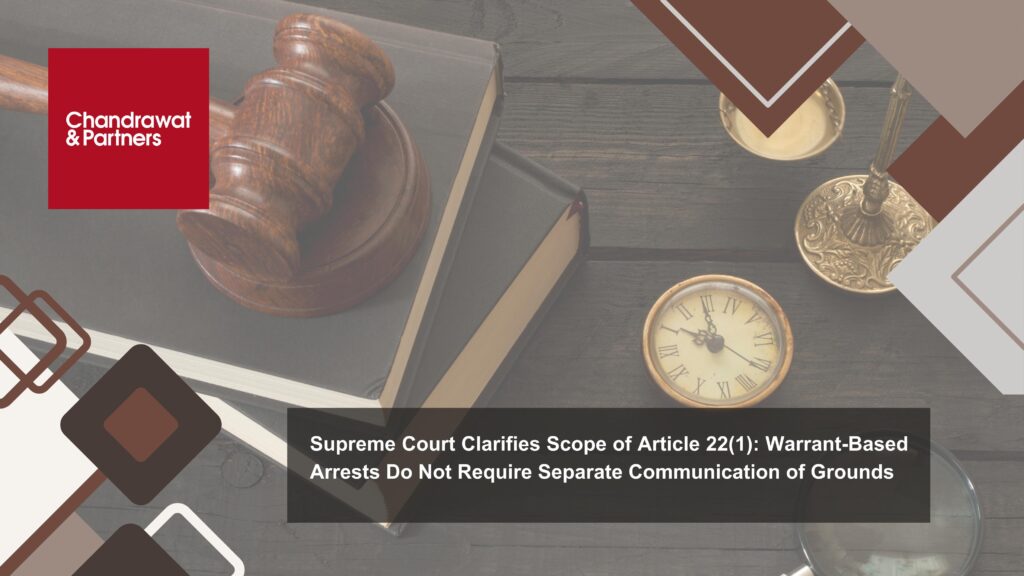Home > Recent Judgements > Supreme Court Clarifies Scope of Article 22(1): Warrant-Based Arrests Do Not Require Separate Communication of Grounds
May 26, 2025
Supreme Court Clarifies Scope of Article 22(1): Warrant-Based Arrests Do Not Require Separate Communication of Grounds
Introduction
In a notable interpretation of Article 22(1) of the Constitution of India, the Supreme Court today held that when an arrest is made pursuant to a warrant, there is no separate obligation to inform the arrestee of the grounds of arrest, as the warrant itself satisfies this requirement. This decision clarifies the procedural obligations of arresting authorities and brings constitutional precision to an area often debated in criminal jurisprudence.
What Article 22(1) Says
Article 22(1) of the Constitution mandates that:
No person who is arrested shall be detained in custody without being informed, as soon as may be, of the grounds for such arrest.
This provision is a cornerstone of the constitutional guarantee against arbitrary detention and enshrines the principle of procedural fairness.
Supreme Court’s Ruling: The Crux
The Supreme Court, in its ruling it was held that when a person is arrested under the authority of a warrant, the requirement under Article 22(1) to separately communicate the grounds of arrest does not arise.
Key Reasoning
- A warrant of arrest is issued by a competent judicial authority based on valid legal grounds.
- The warrant itself reflects the reasons for the arrest, including the nature of the offense and the judicial mind applied.
- Therefore, serving the warrant to the arrestee constitutes adequate communication of the grounds of arrest.
This approach draws a clear distinction between warrant-based arrests and arrests without warrant, such as those made by police officers under Section 41 of the CrPC, where a separate communication of reasons is constitutionally essential.
Legal and Practical Implications
- Clarification of Police and Judicial Procedure
This judgment brings clarity to police officers and magistrates by specifying that:
- In warrant-based arrests: Issuing and serving the warrant suffices.
- In non-warrant arrests: Separate, explicit communication of reasons is mandatory.
- Reinforcement of Due Process
By emphasizing the sufficiency of the warrant in satisfying Article 22(1), the Court has:
- Reduced redundancy in procedure where due judicial process has already been exercised.
- Balanced the protection of individual liberty with procedural efficiency.
- Guidance for Defense Lawyers and Rights Advocates
Defense counsel must now distinguish more carefully between procedural violations in warrant-based and non-warrant arrests. A challenge to an arrest on grounds of non-communication may now be weaker if the arrest was made via a valid warrant.
Conclusion
This decision marks a significant clarification in constitutional arrest jurisprudence, aligning procedural practice with judicial efficiency. It reflects the Court’s continued effort to refine the balance between individual liberties and the effective administration of justice.
As procedural rights continue to evolve, especially in an era of increased surveillance and state power, this ruling serves as a reminder of the central role of judicial authorization in legitimizing state action.
For more information or queries, please email us at
enquiries@chandrawatpartners.com





